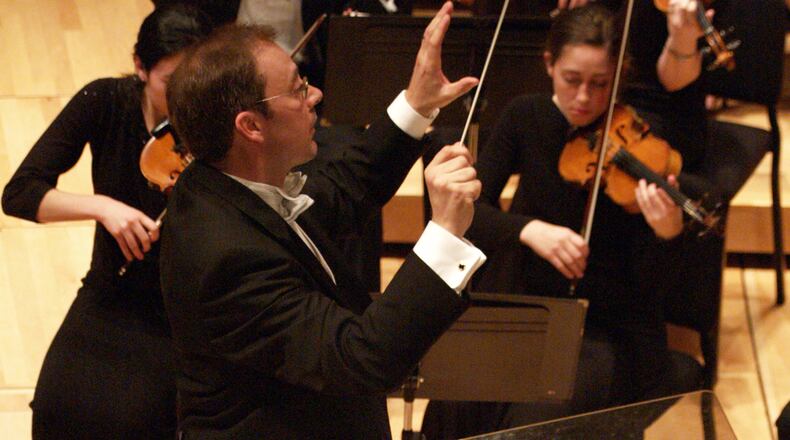Atlanta composer-conductor-educator Richard Prior has had an intimate view of the cacophonous drama that has accompanied the Atlanta Symphony Orchestra musician lockout, and it’s filled him with mixed feelings.
Prior, whose Symphony No. 3 is scheduled to be performed by the ASO in late November, assuming a collective bargaining agreement is reached, conducted the locked-out players and ASO Chorus (billing themselves as ATL Symphony Musicians and Atlanta Mozart Choir) in two packed performances Friday night at Oglethorpe University.
And the Emory University Department of Music conducting chair and Emory Symphony Orchestra maestro will lead the ASO musicians again Tuesday night in another benefit concert at Dunwoody United Methodist Church, featuring cellist Matt Haimovitz in Haydn’s Cello Concerto in C Major as well as Prior’s own “Elegy for Aurora.”
“Everybody says, ‘Oh, it’s wonderful to work together,’ and I say, ‘Yes, but I so wish that we weren’t,’” the British-born conductor said with a chuckle, acknowledging an opportunity he’s savored while being aware that it exists only because the lockout has extended into its fifth week. (Both sides have been notably quiet since federal mediator Allison Beck restarted negotiations a week ago.)
Prior, 48, also will conduct Emory Symphony Orchestra’s season-opening concert Saturday night featuring Emory artist in residence Haimovitz on the world premiere of the maestro’s Concerto for Cello and Orchestra.
The busy maestro recently shared his thoughts with The Atlanta Journal-Constitution …
On how his debut as guest conductor of the ASO musicians went: "The Barber (Adagio for Strings)/Mozart (Requiem) performances were quite wonderful. The atmosphere was understandably electric for both, with a warm and heartfelt reception of the music and the musicians by the audiences. It was extraordinarily meaningful and poignant. Yet another example and living proof of the caliber of artistry that we have — and should have — in Atlanta."
On the tangible joy the musicians feel being back together: "This is what they do. This is who they are. Being musicians, where there's so much of a communal aspect to what we do, we move in a gregarious way and we need to be together to make the magic happen. So everybody is absolutely glad to be performing and making the art that we do. But obviously there's also the background sense of the conditions in which we're working."
On aspects he appreciates in the ASO's sound: "One is, of course, we have an extraordinary group of amazingly talented musicians. You can look at it from the perspective of the woodwinds: We have (principal flautist) Christina Smith, who has, to my ear, a very particular, sparkly energized sound, and (principal oboe) Elizabeth Koch Tiscione and (principal clarinet) Laura Ardan … these more individualistic colors in the winds and the brass, for instance, kind of against the backdrop of the more amassed strings.
“I think it’s very clear that as instrumentalists, (ASO musicians) are capable of imprinting their own sound. On the one hand, it’s an individual thing. But when you put all of those individual things together in the corporeal setting, it makes the whole.”
On the importance of reaching a deal and keeping the orchestra together: "One of the things that really concerns me is we have this wonderful collection of musicians, many of whom are recognized within the profession and who have immediately been offered sub work with other orchestras. So there's this great diaspora of talent, where these people have been snapped up by New York, Chicago, Cleveland. And the good Lord forbid that if there's some sort of permanent opening somewhere, we would start to see attrition. …
“All these (ASO musicians) who, to make ends meet, have been welcomed into the arms of other great orchestras. So it’s just a sad commentary on what seems to have been allowed to happen here, which is: Cleveland and Chicago and Philadelphia and New York obviously really value their orchestras, so what is wrong with this picture for Atlanta?”
About the Author
The Latest
Featured


